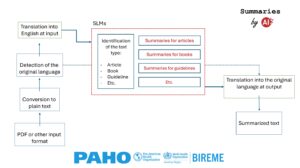The integration of Artificial Intelligence (AI) into BIREME/PAHO/WHO products and services is a strategic step toward making health information management and dissemination more agile and efficient. With the use of AI techniques, it is possible to optimize the automatic indexing process, improve information retrieval in BIREME search interfaces, perform data analysis for decision-making, among other benefits.
In the area of Digital Frontiers, BIREME has already developed sustainable initiatives that use AI tools to improve information management and dissemination processes. Among these initiatives, we highlight Super Summaries, which synthesizes the content of scientific article abstracts, and DeCS Finder AI, which assists in the bibliographic indexing process using the controlled vocabulary DeCS/MeSH. In addition, a fully automatic indexing process is under development, something unique in the Region. This new product, Summaries by IA, aims to generate abstracts from the full text to improve bibliographic description. A highlight of this new product is the direct benefit to the quality of automatic indexing and the entire bibliographic description chain.
The description of a document needs to be as complete as possible, as the quality of indexing and the accuracy of information retrieval depend on it. In organization and cataloging processes, especially in digital environments, every detail makes a difference: from the title to the metadata that describes the content, context, and purpose of the document. A detailed description allows users to find what they are looking for more easily and ensures the integrity and accessibility of the information sources.
For indexing using a thesaurus, the more relevant information included, the better the result. In addition to basic metadata, it is essential that the document has a complete summary or abstract, capable of providing more data for the indexing process, understanding of the document described, and its contextualization. This wealth of information contributes to a more accurate search and a more faithful synthesis of the content. For this reason, BIREME, in the context of Digital Frontiers and development with AI tools, has initiated a project aimed at the automatic generation of abstracts from the full text, in three languages.
However, there are several challenges to be faced in this initiative, especially with regard to the treatment of full texts. One of the most critical points is the conversion of documents from PDF format to text, an essential step in making the content readable and processable by Artificial Intelligence systems. This transformation is necessary for algorithms to properly identify, understand, and summarize the information in the document. Overcoming this technical challenge is essential to ensure the quality of the summaries generated and, consequently, to improve the entire process of automated indexing and bibliographic description.

Figure 1. Summaries generation flow from the full text
Figure 1 shows the abstract generation flow by AI, starting with the conversion of PDF documents to plain text, followed by the detection of its original language and, if necessary, translation into English. This initial translation process into English is necessary because the models are optimized for this language. Next, a specialized language model identifies the type of text (article, book, guideline etc.), and from there it is directed to the specialized (fine-tuned) model for each type of text. Finally, the summarized text is translated back into the original language, resulting in a standardized, multilingual final abstract adapted to the type of document.
The incorporation of AI into BIREME’s processes represents an important milestone in the modernization of health information management. The use of technologies such as automatic summary generation, assisted indexing, and multilingual translation significantly increase the efficiency, accuracy, and reach of informational content. Despite technical challenges, these initiatives show consistent progress toward the continuous improvement of the quality of products and services developed by BIREME. These actions reinforce the Center’s commitment to using technological innovation to strengthen access, organization, and dissemination of health information and scientific knowledge throughout the Region.